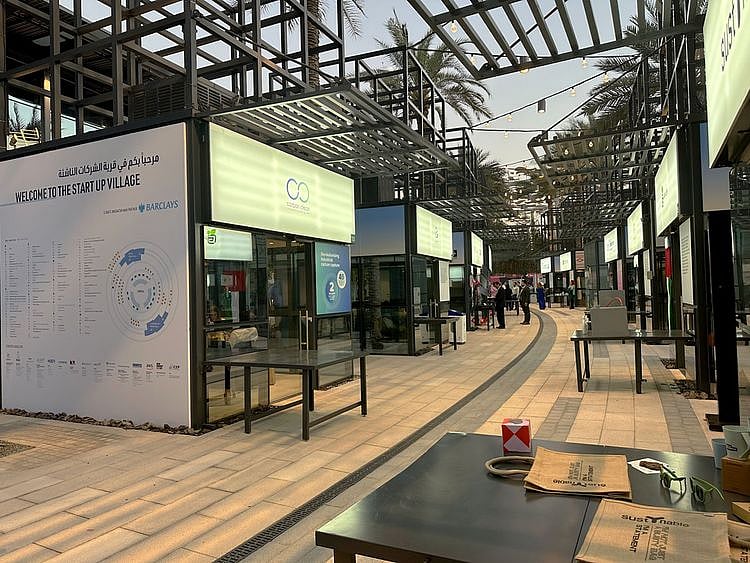COP28 in UAE: Startups promise green solutions to save the world
Startup Village showcases technologies for clean energy, food security, pollution control

Tomorrow’s solutions for today’s world. That’s what startups promise at the COP28 UN Climate Summit in Dubai. It’s no idle boast. All the companies at The Startup Village have working models deployed in a few places, albeit in a small way. With more funding and research, these sustainable solutions could be scaled up to fight global warming.
Clean energy, eco-friendly technology, solutions to water crises, decarbonisation, carbon capture, food security, waste management, solar energy generation and reduction of methane emissions are among the solutions showcased in Expo City.
About 150 high-growth companies working on climate change and environmental challenges have been brought to COP28 UAE to collaborate with businesses, investment communities, government leaders and policymakers. The new technologies have the potential to turn green ambitions into reality, which is critical to peg global warming under 1.5˚C.
A cool paint to keep heat away
Take the case of I2Cool. The Hong Kong-incubated startup technology provides electricity-free cooling with a paint that employs solar reflection and mid-infrared emission. “This is achieved by integrating nanoparticles inspired by Saharan silver ants that survive in the desert heat. The paint reduces the surface temperature by 40-60˚C and indoor temperature by 10-12˚C,” Harsh Udeshi, business development manager, said.
Agritrack provides continuous monitoring of food from farm to fork. The Athens-based startup uses predictive microbiology to track quality from farm to fork. “At least 15% of the globally produced food is wasted before it reaches the market. Our technology allows companies to decide on selling the produce at the local market instead of exporting, or sell it at half-price if its shelf life becomes short,” George Skrimpas, chief technical officer, said.
Here are some more startups with the technology and solutions to make the world greener.
Lyten is building an industry for decarbonisation supermaterials. Some of its products include Lithium-Sulphur batteries that target high energy density and half the weight of lithium ion; composites that require up to 50 per cent fewer materials; and Internet of Things sensors that require no electronics.
SolarSpace, a startup from Tucson, Arizona, offers solar energy generation technology. It uses large mirrors to focus sunlight to generate intense heat, which is converted into sound waves before turning it into electric power efficiently.
How do you decarbonise cattle?
Rumin 8 is on a mission to decarbonise 100 million cattle by 2030. The startup says its technology makes it possible to decrease methane production and increase yield at a low cost and with less carbon footprint.
Breakthrough Energy is a global network working towards a clean energy future. They fund zero-carbon technologies, advocate climate-friendly policies and rally partners to eliminate emissions across all sectors.
Rondo Heat Batteries says it delivers constant zero-carbon heat for the industry at a lower cost than natural gas. The company is in commercial operation and aims to create the world’s largest market for stationary storage.
Tsubame bhb is a Japanese startup that employs eco-friendly technology to make low-cost fertiliser using green ammonia. They manufacture ammonia with carbon-free fuel — solar, wind, or hydroelectric power — at lower temperatures. The ammonia is then turned into fertilisers like ammonium sulphate.
Alhytec has a recycling technology for aluminium-containing waste. It has developed a device to produce green aluminium hydroxide and green hydrogen from aluminium waste.
How to turn CO2 into rock
The startup 44.01 focuses on eliminating CO2 by turning it into rock. Its technology accelerates the natural process of CO2 mineralisation in peridotite to remove CO2 permanently in less than 12 months.
Green Boom offers biodegradable oil absorbents, which eliminate toxic waste generated by traditional oil spill clean-up methods.
Ecoloo provides a sustainable sanitation solution using bacterial culture to treat human waste. Its award-winning technology is odour-free, water-free, sewage-free and energy-free.
Avani offers sustainable and compostable disposable packaging solutions and eco-friendly alternatives to hospitality and retail industries. Its affordable solutions minimise the amount of toxic plastics in ecosystems.
With small-scale, decentralised water recycling systems, Wota takes on the world’s water crises. The Japanese company’s solutions can solve water shortage and water pollution through onsite recycling. It was used in the aftermath of the earthquake in Turkey and has projects in Antigua and Barbuda, as well as Japan.
Sign up for the Daily Briefing
Get the latest news and updates straight to your inbox
Network Links
GN StoreDownload our app
© Al Nisr Publishing LLC 2026. All rights reserved.